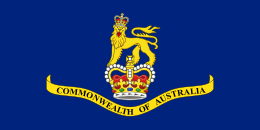Bill Hayden
William George Hayden AC (born 23 January 1933) is a former Australian politician who served as the 21st Governor-General of Australia, in office from 1989 to 1996. He had earlier been leader of the Labor Party from 1977 to 1983, as well as serving as a cabinet minister in the Whitlam and Hawke Governments.
Bill Hayden AC | |||||||||||||||||||||||||||||||||
|---|---|---|---|---|---|---|---|---|---|---|---|---|---|---|---|---|---|---|---|---|---|---|---|---|---|---|---|---|---|---|---|---|---|
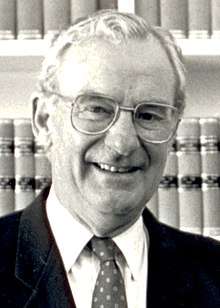 | |||||||||||||||||||||||||||||||||
| 21st Governor-General of Australia | |||||||||||||||||||||||||||||||||
| In office 16 February 1989 – 16 February 1996 | |||||||||||||||||||||||||||||||||
| Monarch | Elizabeth II | ||||||||||||||||||||||||||||||||
| Prime Minister | Bob Hawke Paul Keating | ||||||||||||||||||||||||||||||||
| Preceded by | Sir Ninian Stephen | ||||||||||||||||||||||||||||||||
| Succeeded by | Sir William Deane | ||||||||||||||||||||||||||||||||
| Leader of the Opposition | |||||||||||||||||||||||||||||||||
| In office 22 December 1977 – 3 February 1983 | |||||||||||||||||||||||||||||||||
| Prime Minister | Malcolm Fraser | ||||||||||||||||||||||||||||||||
| Deputy | Lionel Bowen | ||||||||||||||||||||||||||||||||
| Preceded by | Gough Whitlam | ||||||||||||||||||||||||||||||||
| Succeeded by | Bob Hawke | ||||||||||||||||||||||||||||||||
| |||||||||||||||||||||||||||||||||
| |||||||||||||||||||||||||||||||||
| |||||||||||||||||||||||||||||||||
| Personal details | |||||||||||||||||||||||||||||||||
| Born | William George Hayden 23 January 1933 Brisbane, Queensland, Australia | ||||||||||||||||||||||||||||||||
| Political party | Labor | ||||||||||||||||||||||||||||||||
| Spouse(s) | Dallas Broadfoot
( m. 1960) | ||||||||||||||||||||||||||||||||
| Children | 4 | ||||||||||||||||||||||||||||||||
| Education | Brisbane State High School | ||||||||||||||||||||||||||||||||
| Alma mater | University of Queensland | ||||||||||||||||||||||||||||||||
| Occupation | Police officer (Queensland Police Service) | ||||||||||||||||||||||||||||||||
| Profession | Politician | ||||||||||||||||||||||||||||||||
Hayden was born in Brisbane, Queensland. He attended Brisbane State High School and then joined the Queensland Police, working as a police officer for eight years while studying economics part-time at the University of Queensland. Hayden was elected to the House of Representatives at the 1961 federal election, aged 28 – along with Manfred Cross and Doug McClelland, Hayden is the earliest elected Labor MP still alive.[1] When Gough Whitlam led the Labor Party to victory in 1972, he was made Minister for Social Security. He replaced Jim Cairns as Treasurer in 1975, but served for only five months before the government was dismissed.
In early 1977, Hayden challenged Whitlam for the party leadership and was defeated by just two votes. He defeated Lionel Bowen to succeed Whitlam as Leader of the Opposition at the end of the year, following Labor's defeat at the 1977 election. Hayden led the party to the 1980 election, recording a substantial swing but falling well short of victory. He was replaced by Bob Hawke just a few weeks before the 1983 election, after months of speculation. Hayden served as Minister for Foreign Affairs and Trade from 1983 to 1988, then left parliament to assume the governor-generalship. He held that position for seven years, with only Lord Gowrie having served for longer.
Early life
Born in Brisbane, Bill Hayden was the son of George Hayden, an Irish-American sailor originally from Oakland, California, and already 52 years old at the time of Bill's birth.[2] His paternal grandparents were from County Cork, Ireland and significant parts of his approach to social issues and politics throughout his public life reflected this background and non-denominational education at Brisbane State High School.[3]
A keen sportsman, he played rugby and rowed, and served in the Australian Military Force, and Navy as well as the Queensland Public Service and Police Force (the latter, from 1953–61).[4] He continued his education privately, completing an economics degree (on a part-time basis) at the University of Queensland. Prior to the 1970s, he was a self-described democratic socialist.[5]
Politics (1961–1988)
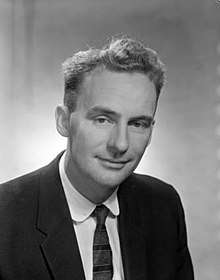
During the late 1950s he became active in the Labor Party.[6] In the 1961 federal election he surprised almost everyone, including himself, by winning the House of Representatives seat of Oxley, located in southwest Brisbane.[7] He ousted Don Cameron, the Minister for Health in the Menzies Liberal government, on a nine-point swing. Hayden's win was part of a 15-seat swing to Labor that nearly brought down the Menzies government.
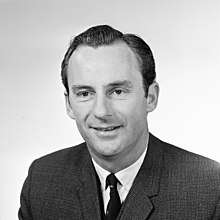
Overcoming initial resistance to his membership of the Labor party (due to a distrust within the party of his father's views as being too radical), Hayden was soon popularly elected as one of the then youngest members of the federal parliament (only 28 years old at the time he entered it). He proved to be a diligent, well-spoken parliamentarian.[8] In 1969, he became a member of the Opposition front bench.[9] When Labor won the 1972 election under Gough Whitlam, Hayden was appointed Minister for Social Security, and in that capacity, among other efforts to promoting reform, introduced the single mothers pension and Medibank, Australia's first system of universal health insurance. On 6 June 1975, he succeeded Jim Cairns as Treasurer, a position he held until the Whitlam government was dismissed by the Governor-General, Sir John Kerr, on 11 November 1975. Labor suffered its worst-ever defeat in the election held a month later, and Hayden was left as the only Labor MP from Queensland.[10]
Opposition leader
When Labor lost the 1977 election in yet another landslide, Whitlam retired as leader. In the ensuing leadership election Hayden was elected over Lionel Bowen to succeed him; Bowen was then elected as Hayden's deputy. Aged 44, he was the youngest person to be elected leader of the Labor Party since Chris Watson in 1901. His political views had become more moderate, and he advocated economic policies which encompassed the private sector and the American alliance.
At the 1980 election. Labor finished a mere 0.8 percent behind Fraser's government on the two-party vote, having gained a nationwide swing of over four percent. Yet, due to the geographically uneven nature of the swing (strong in Victoria and, to a lesser degree, Western Australia and New South Wales, but comparatively weak everywhere else), Labor fell 12 seats short of toppling the Coalition. Hayden did, however, regain much of what Labor had lost in the previous two elections. He also slashed Fraser's majority in half, from 23 seats to 11.
By 1982 it was evident that Fraser was manoeuvring to call an early election. But the main threat to Hayden came less from Fraser than from elements in Hayden's own party. Bob Hawke, a former union leader who had been elected to Parliament two years earlier, began mobilising his supporters to challenge Hayden's leadership. On 16 July 1982 Hayden narrowly defeated a challenge by Hawke in a party ballot but Hawke continued to plot against Hayden.[11]
In December Labor surprised many pundits by its failure to win the vital Flinders by-election in Victoria, further raising doubts about Hayden's ability to lead the ALP to power.[12] On 3 February 1983, in a meeting in Brisbane, various leading Labor figures, including Paul Keating and Senator John Button, told him that he must resign.[11] He reluctantly accepted their advice.[13] Hawke was then elected leader, unopposed.
Fraser had been well aware of the infighting within Labor and wanted to call an election before the party could replace Hayden with Hawke. On the same morning that Hayden resigned—and unaware that Hayden had resigned—Fraser asked for, and was granted, an election for 5 March. Fraser only learned of Hayden's resignation a few hours before the election writs were issued. At a press conference that afternoon Hayden, still chagrined, said that "a drover's dog could lead the Labor Party to victory, the way the country is".[14] Hayden's quip about a "drover's dog" became part of Australian political history. Hayden himself referred to it good-humouredly many years when he said, "There are so many things I did in my political life that I am very proud of. ... But the one thing I am remembered for is damn well saying 'A drover's dog could win the next election'. It seems to have settled into political idiom. The only person who didn't like it was Bob Hawke."[15]
Foreign Minister
Labor won the 1983 election handily, and Hayden became Minister for Foreign Affairs and Trade. In that post, he advocated closer integration between Australia and its Asian neighbours. In a 1983 interview, he stated: "Australia is changing. We're an anomaly as a European country in this part of the world. There's already a large and growing Asian population in Australia and it is inevitable in my view that Australia will become a Eurasian country over the next century or two. Australian Asians and Europeans will marry another and a new race will emerge: I happen to think that's desirable." Asiaweek, 19 August 1983.[16]
_1988_Bill_Hayden%2C_Russian_FM_Shevardnadze%2C_Moscow.jpg)
As Foreign Minister Hayden had oversight of the Australian foreign aid program. He pursued efforts to engage Vietnam and Cambodia despite vehement opposition from allied nations and key stakeholders. In 1983 Hayden announced a review of the Australian foreign aid program (known as the "Jackson Review" after the chair, Sir Gordon Jackson) which reported in March 1984.[17] The main recommendations of the report, which were directed at improving the professional quality of the Australian aid program, were accepted by the Government. During the next few years, in various speeches Hayden set out the foreign aid priorities of the government.[18]
Governor-General (1989–1996)
After winning the 1987 election, Hawke offered Hayden the post of Governor-General as a consolation for replacing him earlier as Labor Leader in 1983 and thus denying him the chance to become Prime Minister. The Queen's appointment of Hayden as Governor-General to succeed Sir Ninian Stephen was announced in mid-1988.[19] In the following months, Hayden resigned from Parliament and severed his political connections with the Labor Party. He took up the post of Governor-General in early 1989 and served during the period of transition from the Hawke Government to the Keating Government in December 1991. The usual term of for a Governor-General was five years but, by agreement between the government and Hayden, his term was extended for an additional two years to early 1996.[20][21]
Upon his appointment as Governor-General, he became, ex officio, Chancellor and Principal Companion of the Order of Australia.[22] He had previously said he would never accept any honours.
The Governor-General is normally the Chief Scout of Australia.[23] Hayden declined the office, because he had identified an atheist, which was incompatible with the Scout Promise.[24] Instead, he served as the "National Patron" of the Scout Association during his time in office.
Later life
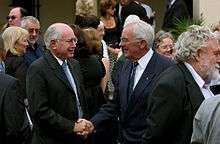
By the late 1990s Hayden joined the board of Quadrant. In the debate preceding the 1999 republic referendum, he rejected the specific proposal and sided with the monarchists,[25] stating he only supported direct election of a president.[26]
Since retirement from the position of Governor-General, Hayden has continued to contribute to public policy discussion in Australia. While on the board of Quadrant, he took time to lend personal support to the publication and wrote a tribute to its editor P.P. McGuinness on his death in 2008.[27] He has also continued to write opinion and comment pieces for other magazines and newspapers in Australia about current social, economic and political issues including foreign affairs.[28]
In September 2018, Hayden was baptised as a Roman Catholic at St Mary's Church, Ipswich. He told The Catholic Leader that "there’s been a gnawing pain in my heart and soul about what is the meaning of life".[29] The baptismal ceremony was attended by a gathering of family, friends, and former colleagues. Hayden's siblings, Patricia Oxenham, John Hayden, and Joan Moseman, along with other members of family, were present for the event.
Honours
By virtue of being Governor-General, he was the Chancellor of the Order of Australia and its Principal Companion (AC).[20]
He received an Honorary Doctorate of Laws from the University of Queensland in 1990 for his distinguished contributions to Australian life. Other awards included admission to the Order of St John Australia and also the Gwanghwa Medal of the Korean Order of Diplomatic Merit.[30]
In 1996 he was recognised as the Australian Humanist of the Year by the Council of Australian Humanist Societies.[31] In 2007 at the 45th State Conference of the Queensland Branch of the Australian Labor Party, Hayden was made a Life Member of the party.
In September 2017, in delivering the second Hayden Oration at the University of Southern Queensland in Ipswich, former Australian prime minister Paul Keating spoke at length of Hayden's contribution to the Labor Party. Keating spoke, in particular, of the reform period during the Hawke Labor Government in the 1980s in Australia. He noted that the foundations for the reforms had been set down before the Labor Party won office in 1983 during the period when Hayden was Leader of the Opposition and was working to prepare the Party for government. "Those great reforms", Keating said, "began with the frameworks Bill Hayden brought to the front bench, the day he became Leader of the Labor Party."[32]
Styles and honours
- Mr Bill Hayden (1933–61)
- Mr Bill Hayden MP (1961–72)
- The Hon Bill Hayden MP (1972–88)
- The Hon Bill Hayden (1988–89)
- His Excellency the Hon Bill Hayden AC (1989–96)
- The Hon Bill Hayden AC (1996–present)
Hayden oration
A series of Hayden orations, sponsored by the University of Southern Queensland has been established to honour Bill Hayden. Lectures held in the series include the following:
- 2016 First Oration, David Hamill, 14 August.
- 2017 Second Oration, Paul Keating, 29 September.
- 2018 Third Oration, Neal Blewett, 15 August.
Notes
- Malcolm Farnsworth (2020). "Living Former Members Of The House Of Representatives (1949–1972)".
- Bill Hayden, Hayden: An Autobiography, op. cit, p. 7.
- Hayden, ibid.
- "Bill Hayden), former Australian Governor-General". Alumni. University of Queensland. Archived from the original on 7 June 2007. Retrieved 26 May 2007.
- "Interview: Bill Hayden on the Dismissal – 30 years later". Australian Broadcasting Corporation. 5 November 2005.
- Murphy, Denis (1980). Hayden: A Political Biography. Australia: Angus and Robertson. p. 8. ISBN 0-207-14101-0.
- Murphy, ibid, p. 12.
- Hayden spent a good deal of the 1960s thinking through Australian public policy issues and his own approach to politics. He discusses this in his autobiography (Hayden, 1996, op. cit, Part II). As part of this process he produced a pamphlet on democratic socialism published as W.G. Hayden, 1968, The Implications of Democratic Socialism, Victorian Fabian Society.
- Murphy, op. cit., p. 48.
- Murphy, op. cit, p. 147.
- Bill Hayden (1996). "Hayden: An Autobiography". Pymble N.S.W.: Angus & Robertson. Archived from the original on 18 December 2010. Retrieved 11 September 2010.
- Editorial, "Flinders fallout", The Australian Financial Review, 6 December 1982, and Gregory Hywood, '"Kingmaker" Button ponders Hayden's future', The Australian Financial Review, 24 December 1982.
- Simon Balderstone, 'The 'Little General' who had to drop a friend', The Age, 5 February 1983.
- "Statements from Hayden Bowen, Hawke". The Canberra Times. 57 (17, 295). Australian Capital Territory, Australia. 4 February 1983. p. 7. Retrieved 28 January 2018 – via National Library of Australia.
- ktendolle (26 August 2013). "Drover's dog couldn't win this time: Hayden". Retrieved 19 August 2018.
- Quoted in Pacific centuries: Pacific and Pacific Rim History since the Sixteenth Century by Dennis Owen Flynn, Lionel Frost, A. J. H. Latham, 1999, Routledge, page 232
- Australian Government Publishing Service, Report of the Committee to Review the Australian Overseas Aid Program, Canberra, ISBN 0 644 03344 4.
- Bill Hayden, 'Policy and Economics of Foreign Aid', Economic Analysis and Policy, 17 (1), March 1987.
- There had been considerable media speculation about the appointment in the months beforehand but the decision was only confirmed when an official announcement was made. See Ramsey, Alan (12 March 1988). "When the numbers add up, or do they?". The Sydney Morning Herald.; McGuiness, Padraic P. (15 March 1988). "Drover's dog no Kerr". The Australian Financial Review.; and Grattan, Michelle (30 July 1988). "The long and winding road to Yarralumla", The Age, 30 July 1988.
- "Governor-General's Role". Governor-General of the Commonwealth of Australia. 13 June 2017. Archived from the original on 11 April 2019. Retrieved 3 February 2018.
- "Governors-General Since 1901". Australian Politics.com. Retrieved 3 February 2018.
- "Governor-General's Role". Governor-General of the Commonwealth of Australia. Archived from the original on 11 April 2019. Retrieved 3 February 2018.
- "Chief Scout". Scouts Australia. Archived from the original on 12 October 2007.
- "Brief Comments". Australian League of Rights. Archived from the original on 4 December 2007.
- Reporter: Sally Sara (7 October 1999). "Anti-republican cause recruits Bill Hayden". PM. ABC. ABC Radio National.
- "Republicans call for the real Bill Hayden to stand up in the No referendum case". Archived from the original on 28 November 2001. Retrieved 21 June 2008.CS1 maint: BOT: original-url status unknown (link) Republic.org.au, 17 August 1999.
- 'Workingman's friend', The Australian, 29 January 2008
- See his article on gay rights in Australia, 'We've come so far on gay rights but it's not enough', The Punch, 6 October 2009 , and his comment on US-China relations in Asia 'Caught in the US-China wash', The Australian 11 June 2011 .
- "Former atheist and political leader Bill Hayden baptised at age 85 at St Mary's Church, Ipswich". The Catholic Leader. 18 September 2018. Retrieved 18 September 2018. See also Kristian Silva, 'Bill Hayden, former Labor leader, turns to God despite atheist past', ABC News, 19 September 2018.
- University of Queensland, Alumni and Community Archived 20 July 2008 at the Wayback Machine
- Australian Humanists of the Year
- Paul Keating, 'The Hayden Oration 29 September 2017', University of Southern Queensland, Ipswich Campus, Queensland. A summary of Keating's remarks was carried in several major Australian newspapers, including in Mark Kenny, 'Bill Hayden, the most visionary PM we never had, says Paul Keating', The Age, 30 September 2017.
References
| Wikimedia Commons has media related to Bill Hayden. |
- Denis Murphy, Hayden, A Political Biography, Angus & Robertson Publishers 1980 ISBN 0-207-14101-0
- John Stubbs, Hayden, William Hienemann 1989
- Bill Hayden, Hayden, An Autobiography, Angus and Robertson 1996 ISBN 0-207-18769-X
| Parliament of Australia | ||
|---|---|---|
| Preceded by Don Cameron |
Member of Parliament for Oxley 1961–1988 |
Succeeded by Les Scott |
| Political offices | ||
| Preceded by Bill Wentworth |
Minister for Social Security 1972–1975 |
Succeeded by John Wheeldon |
| Preceded by Jim Cairns |
Treasurer of Australia 1975 |
Succeeded by Phillip Lynch |
| Preceded by Gough Whitlam |
Leader of the Opposition 1977–1983 |
Succeeded by Bob Hawke |
| Preceded by Tony Street |
Minister for Foreign Affairs and Trade 1983–1988 |
Succeeded by Gareth Evans |
| Government offices | ||
| Preceded by Sir Ninian Stephen |
Governor-General of Australia 1989–1996 |
Succeeded by Sir William Deane |
| Party political offices | ||
| Preceded by Gough Whitlam |
Leader of the Labor Party 1977–1983 |
Succeeded by Bob Hawke |
